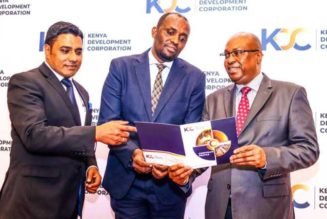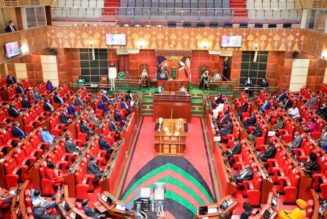Data Hub
Titling woes lock buyers out of cheap homes plan
Thursday February 09 2023
The Ongoing construction of Affordable Housing at Buxton in this photo taken on October 12, 2022. PHOTO | KEVIN ODIT | NMG
The lengthy process of registering and processing title deeds has slowed funding of affordable housing units for workers earning up to Sh150,000 a month, threatening to hurt the implementation of President William Ruto’s priority project.
The Kenya Mortgage Refinancing Company (KMRC) buyers in some of the affordable housing projects completed in the last three years have not been funded through subsidised mortgages because of a lack of title deeds.
KMRC, which is 25.3 percent owned by the National Treasury with the remainder of the stake controlled by private lenders, was incorporated in 2020 to derisk home loans market by raising and lending long-term funds to mortgage providers, largely banks and saccos.
One of the major housing projects where prospective buyers initially couldn’t get subsidised home loans due to lack of titles was the 1,370-unit Park Road project in Nairobi’s Ngara area, the first taxpayer-funded low-cost project.
“The [land] registration process still takes time. There are also titling issues. For example, there are houses that came up two years ago in 2020 like the Park Road one. Up to last year, there were no titles,” KMRC chief executive Johnson Oltetia said in an interview.
“If there’s no title and that is the security that’s held [by banks or saccos], then you will not be able to refinance that loan.”
Prospective homebuyers, who qualify for home loans under the KMRC framework, access up to Sh8 million for houses in the Nairobi metropolitan area and Sh6 million in the rest of the country.
KMRC disbursed Sh5.83 billion to 10 banks and saccos for onward lending to homebuyers last year, more than four times Sh1.34 billion the year before.
The cash refinanced 1,948 mortgages valued at between Sh500,000 and Sh8 million, a sharp 239.37 percent climb over 574 mortgages in 2021.
Cases of missing files have been rife in the land registries. This has made registering property in Kenya one of the most laborious among key economies in Africa, taking an average of 43.5 days in 10 procedures in 2019 as opposed to an average of nine steps in sub-Saharan Africa, according to previous surveys.
Reports of brazen corruption in land registration and titling have been around for years, with officials often accused of hiding files to delay processing in a bid to be bribed.
To mitigate corruption, the Lands ministry has been digitising land registries through installation of National Land Information Management System (NLIMS), which had by June been developed in Nairobi and Murang’a counties.
Read: Opportunities that are on offer under affordable housing
The Sh10 billion NLIMS project, which is being funded in phases by the taxpayers since July 2013, was 61 percent complete at the end of last June, according to the Lands ministry, having gobbled Sh6.07 billion.
The ministry’s data shows the previous regime of President Uhuru Kenyatta processed and registered six million land titles against a target of seven million between July 2013 and June 2022, costing taxpayers Sh11.63 billion.
The title deeds were processed from land adjudication sections, settlement schemes, informal settlements, public institutions, market and urban centres, company and co-operative farms, group ranches, colonial villages and subdivisions.
In the current fiscal year ending June, the ministry was allocated Sh1.77 billion to support the processing and registration of title deeds as well as the digitisation of land offices, funding which is projected to rise nearly double to Sh3.3 billion in the budget ceiling for the year starting July.
The confluence of land titling and the rising cost of construction have been a major impediment to building affordable housing units, hurting the State’s plan for bridging a gaping homes gap for low- and mid-income families which is estimated at more than 250,000 units annually in urban areas.
The previous administration of Mr Kenyatta missed a target of 500,000 units in five years through 2022 by far, while his successor, William Ruto, who served as a powerful deputy president until 2019 when his authority was quietly clipped, has set an ambitious goal of 250,000 units every year.
“We are working together with everyone else to get that [land registration and titling] moving,” Mr Oltetia said. “That is important because even if you have affordable housing units, as long as there is no title or security, we will refinance. Even no bank will be giving funding for that kind of house. That continues to affect scaling up of affordable housing.”
KMRC, which got a permit to formally start operations in September 2020, offers long-term funds to banks and Saccos for onward lending to homebuyers at an annual interest of five percent.
The recipient lenders are, in turn, expected to lend out the cash at a single-digit interest rate.
Homebuyers are allowed up to 20 years to repay the loan, but this is dependent on the individual financier.
“The loan’s tenor is dependent on individual lenders and the lenders will match the tenor with the funding accessed. KMRC will match the same tenors during refinancing,” Mr Oltetia said.
Read: Affordable housing: A real shot at home ownership or hot air?
Banks which have so far accessed funds from KMRC for onward lending are KCB, HFC, Co-op, Absa, Stanbic and Credit Bank, while Saccos are Stima, Tower, Unaitas and Ukulima.









